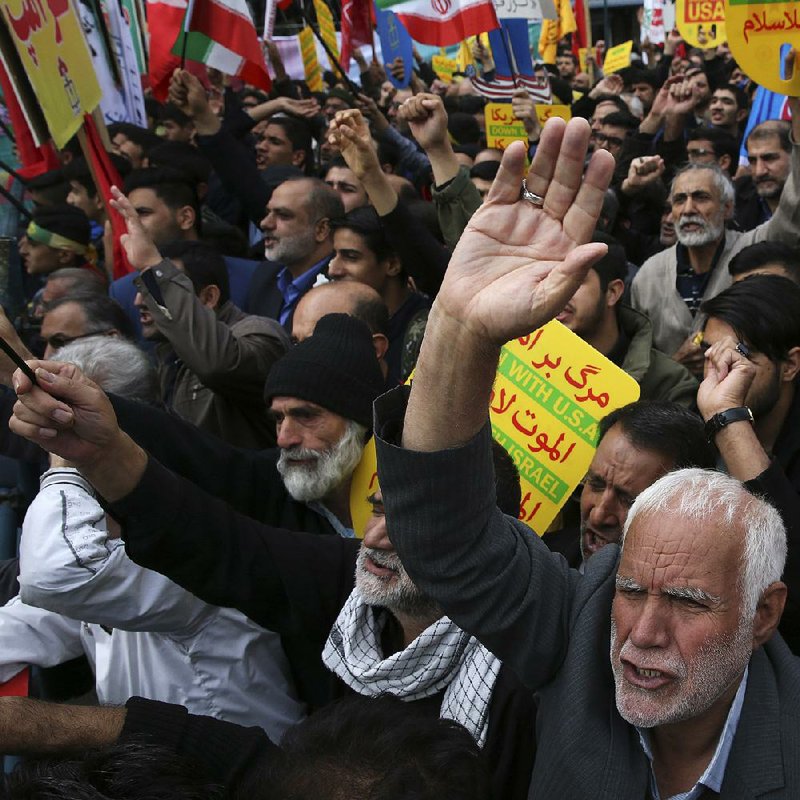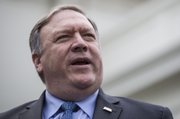WASHINGTON -- Secretary of State Mike Pompeo predicted Sunday that the remaining sanctions against Iran that resume today will change the Tehran government's behavior in the region.
Speaking on Fox News Sunday, Pompeo said the sanctions -- the last ones to snap back after the U.S. withdrawal from the 2015 nuclear deal -- aim to get Tehran to stop supporting militants in the Middle East, stop testing missiles and treat its own citizens with more respect. And he defended President Donald Trump's tweet Friday featuring a Game of Thrones-inspired poster that warned: "Sanctions Are Coming."
Pompeo said that Trump was "putting the world on notice that the terror regime which threatens Israel through Iranian funding of Lebanese Hezbollah, that the terror regime that attempted to conduct an assassination in Denmark over that past few weeks, that the terror regime that continues to fund Houthis launching missiles into Riyadh and into Dubai, that's going to stop. That behavior must change, and sanctions of the United States will be reimposed at midnight tonight."
Asked what the administration would do if the Iranians restart their nuclear program, Pompeo replied, "We're confident that Iranians will not make that decision."
Sunday marks the end of a 180-day deadline the United States set before the second round of sanctions lifted under the 2015 deal were to resume. Although the sanctions are against the financial and shipping sectors, the most significant measures prohibit purchases of Iranian oil, which provides 80 percent of Tehran's tax revenue.
Starting today, all countries and businesses that buy oil from Iran risk secondary sanctions from the United States, and the administration has vowed to pursue offenders aggressively. Virtually all multinational companies that had started doing business in Iran after sanctions were suspended in 2016 have pulled out. That has helped send the Iranian rial plummeting and hurt ordinary Iranians amid spiraling prices for basic goods.
But only a handful of countries support the U.S. action, and Iranian officials have said that the reimposed sanctions underscore how isolated the United States is. Many Middle East analysts also are skeptical that Iran will change its behavior in any way, in a show of defiance.
On Fox News Sunday, Pompeo defended the administration's decision to grant temporary waivers on oil sanctions to eight nations, including some of Iran's biggest oil customers.
Pompeo wouldn't say if India and China are receiving waivers. Bloomberg reported Saturday that India, Japan and South Korea are among those approved, and that China is discussing terms but is among the eight, according to two people familiar with the discussions.
The waivers are aimed at countries that "need a little bit more time" to get their oil purchases from Iran down to zero, Pompeo said, a comment consistent with one Friday, when he said waivers were being given to importers who've made "important moves" toward shunning Iranian oil.
The pressure group United Against Nuclear Iran, which is led in part by former Sen. Joe Lieberman, I-Conn., objected to the waivers Friday, saying on Twitter that the administration had "caved."
On Friday, Trump said in a White House statement that the U.S. remains open to a "new, more comprehensive deal" with Iran that blocks its nuclear weapons program, saying it faced a choice between "its destructive behavior" or "economic disaster."
The administration's strategy is to punish Iran so severely that it's compelled to negotiate a permanent end to its nuclear ambitions, and what the U.S. calls its "malign behavior" in the Middle East. In granting waivers, Washington is trying to ensure that global oil prices don't go up.
Trump told reporters as he left the White House on Sunday for political rallies that the sanctions are the strongest ever imposed by the United States.
'We'll see what happens with Iran. But they're not doing very well," he said. The president did not respond to a question about the waiver.
Pompeo said earlier on CBS' Face the Nation that he was "confident" Iran would not restart its nuclear program with the U.S. withdrawing from the deal.
Pompeo and Treasury Secretary Steven Mnuchin were expected to provide more details on the sanctions at a briefing today.
Pompeo also weighed in on other subjects Sunday.
On North Korea's warning about possibly reasserting a policy of bolstering its nuclear arsenal unless the United States lifts economic sanctions, the secretary of state said that "we've seen this as we go through negotiations" aimed at denuclearization. He plans to meet this week in New York with a senior North Korean official.
Pompeo said that "stray voltage happens to be all around us" but that the U.S. officials "know with whom we're negotiating" and "what their positions are."
Pompeo said Trump has made it clear to the North Koreans -- "no economic relief until we have achieved our ultimate objective."
Pompeo also said the troops going to the southern U.S. border are intended to keep a caravan of migrants from entering the country illegally, but he suggested the migrants may be allowed to enter if they apply through the proper channels.
"If they want to come here lawfully, that's the American tradition, it's the American way," he said on Face the Nation. "We continue to be the most generous nation in the world with respect to immigration. But illegal immigration will not be permitted."
He also said the United States is still seeking to identify everyone involved in the killing of Washington Post contributing columnist Jamal Khashoggi, who was killed last month in the Saudi Consulate in Istanbul. But he also said the incident will not be allowed to harm U.S.-Saudi relations.
"We're working with the Turkish government, with the Saudi government and with anyone else who has relevant facts for us to be able to determine all of those who were responsible for this atrocious murder of Jamal Khashoggi, which the Saudis themselves have acknowledged was premeditated," he said. "We need to get to the bottom of it. We need to find out who was responsible, hold them accountable.
"And do all of this while protecting enormously important strategic interests that the United maintains with the kingdom of Saudi Arabia."
Asked what the administration will do if Crown Prince Mohammed bin Sultan is found to have ordered Khashoggi's killing, Pompeo said, "We are going to chase the facts wherever they go, and we hold accountable each of those who we find responsible."
Information for this article was contributed by Carol Morello of The Washington Post, by Ben Brody of Bloomberg News and by staff members of The Associated Press.
A Section on 11/05/2018


